Album Premiere & Web-Exclusive Interview
Artist: RACHAEL SAGE
Video: Exclusive Character Full-Album Stream
M Music & Musicians magazine is proud to share the exclusive premiere of Rachael Sage’s forthcoming album Character, produced by Sage and Grammy winner Andy Zulla (Kelly Clarkson, Rod Stewart).
Sage is an award-winning, singer-songwriter, instrumentalist and producer. Her latest collection, Character, was recorded while the beloved indie artist was recovering from an unexpected health crisis. Throughout the revelatory 12-song album, Sage reflects on such concepts as gratitude, compassion, authenticity and optimism, questioning what comprises character—and lifting herself up in the process. Sage muses: “I hope these songs honor just how resilient the human spirit can be, and remind us that sometimes ‘it’s ok to not be ok’.”
Balancing the poetic lyricism for which she is best known with a newfound reverence for music as a healing tool, Sage is in the midst of a creative renaissance, merging her experience of survivorship with both music and activism. Character is a musical testament to the miracle and mystery of the human experience, in all its inspiring, painful and confounding glory.
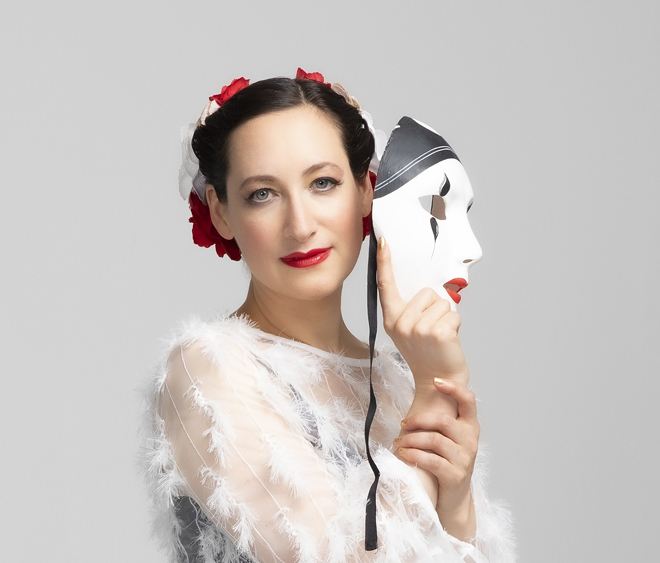
Recorded with engineer Mikhail Pivovarov and Zulla at both Carriage House Studios and her home studio in New York City, Character features longtime collaborators cellist Ward Williams and violinist Kelly Halloran, alongside cellist Dave Eggar (Amber Rubarth), drummer Doug Yowell (Suzanne Vega), guitarist James Mastro (Ian Hunter), and MPress labelmates Seth Glier and Grace Pettis.
We talked with Rachel Sage about her songwriting and the creative inspiration of this bold new album which explores survivorship and how it now means balancing her new commitment to staying healthy with a renewed sense of purpose: creating work that uplifts and empowers others in any way she possibly can. “I have come to realize that music is the most powerful healing tool I have ever encountered. It has quite literally saved my life, and I intend for the rest of my career to be a long, slow dance of gratitude.”
RACHAEL SAGE Interview
with M Music & Musicians magazine publisher, Merlin David
Character is a 12-song collection recorded during cancer recovery. Which song helped you start this album process?
“Bravery’s On Fire” was the song that absolutely had to come out. It was not an easy song for me to write, but it was a huge relief once I was able to take a step back, and say ‘this is exactly how I have been feeling, and now I have the words to help explain it.’ In a way, I definitely felt like my health and my attitude—just being able to be authentic and not let those feelings stay bottled up—really hinged on writing that song!
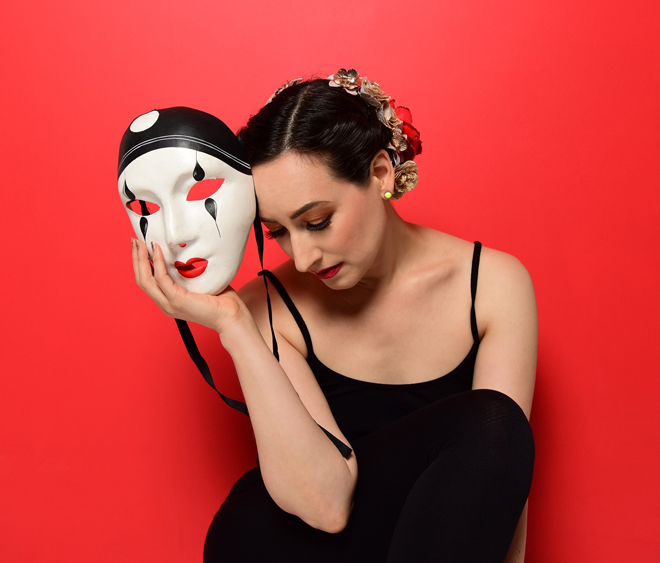
What is something new you learned about yourself while recording this album?
I learned and relearned over and over just how vital it is for me to curate the energy around me. I have always prided myself on being the kind of person who will give someone many more than ‘three strikes.’ In the past, as an empath, I have ignored red flags and allowed negative energy to permeate in a way that literally, made me sick. But I am such a positive, optimistic person by nature. I suppose I have learned, foremost, that just as we ‘are what we eat,’ we are also the people with whom we surround ourselves. I don’t think it is weak to admit that we are vulnerable to shared energy. Now, I listen much harder to my instincts than I did prior to my illness, and to this project. I suppose you could say I have learned to have healthy boundaries that help me prioritize my health, both mentally and physically.
Was writing “Blue Sky Days” therapeutic?
Writing it felt like creating my own roadmap. The music is propulsive, and the piano is very much in my ongoing style as an artist. By harnessing something familiar and fast-moving, I was trying to balance the lyric that admits I ‘don’t know where I’m going.’ For someone who has always wanted to be as in control as possible, that was definitely therapeutic because as most people know, there is only so much one can control, when it comes to cancer itself. But you can control how you approach each day from the moment you wake up, to the relationships you nurture, including the one with yourself. So there is an abundance of hope in remembering that, and it’s a very uplifting song for me to perform as a result.
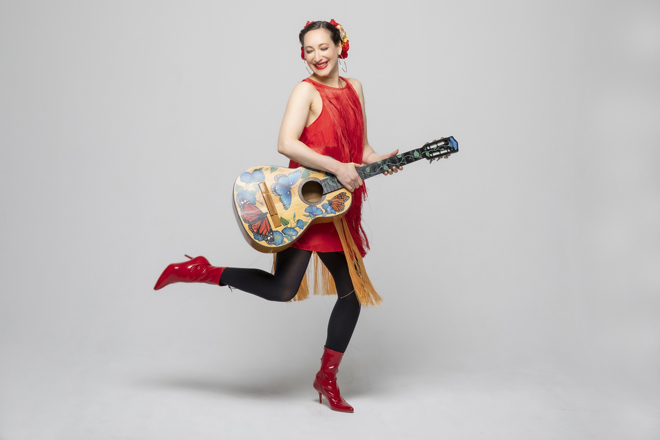
How did the idea of “Bravery’s on Fire” come to you?
It was written from a place of frustration and overwhelm, no question. Being someone who has generally been a leader and in charge—whether of my own career, my record label or even to an extent, the grounded one in my personal relationships—it was incredibly difficult to wave my white flag, so to speak. There came a point during my treatment when it crystallized very clearly that I had to start asking for what I actually needed, not what would make anyone else’s life easier, just because it has been in my nature to handle not only my own stuff, but a lot of other people’s too. I had to create a new language to express what I was feeling. And while it’s a metaphor, I can say with a certain degree of sadness that I literally felt, at points, like there was so much internal chaos in my attempt to handle everything a particular way—that I did truly feel like I was burning out. It can be very exhausting holding up a ‘brave front,’ and that was something I was pretty sure, as I was writing it, that a lot of people would relate to.
What are the challenges of writing a personal song like “Damaged”?
I almost didn’t put “Damaged” on the record, because it was so very personal. But I felt it was important, because it reflected a very real part of my cancer experience, when my proverbial skin became so thin that I could no longer ignore issues that I might have otherwise tolerated, in a difficult relationship, in spite of love’s best intentions. It is a song, ultimately, about seeing a situation clearly and being able to reflect on it with compassion, while also making the difficult decision to take care of oneself. In the context of the album, the title also plays with the concept of ‘preexisting conditions,’ and how they can be either mental or physical. When it comes to cancer, unfortunately the physical trauma one is experiencing from treatment may be compounded by the anxiety or preconceptions of others. Not everyone can handle it, unfortunately—but luckily I was able to summon strength and achieve a kind of cleansing just by writing about it.
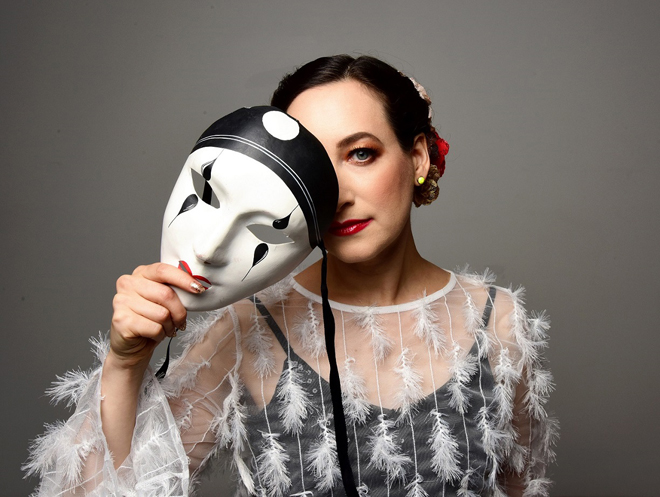
The powerful song “When I Was Young” is compelling.
It is essentially about the feeling of humility that occurs when instead of asking ‘why me?,’ you ask ‘why not me?’ I mean, everyone is young, eager, full of hope, dreams and has an idea of how their life might go. I have always known cancer ran in my family, but still—I never pictured myself getting that. Why is that? What is it about our wiring as human beings that allows us to be a child, then a teenager, then a young adult and even get to middle age, and just go about each day with blinders to what could happen? Whatever it is, it is certainly a blessing in the sense that it allows us to keep worrying to a minimum. But unfortunately, it can also create a kind of complacency. This song is a meditation on that idea—that no one person is any more or less apt to encounter illness or ‘lose their dignity’ than another, however temporarily. We all bleed red, as the saying goes. We are all equally important and insignificant. We are all a universe and a speck of dust. I have always written a lot about duality, perhaps because of my being raised Jewish—but that’s really what I was exploring here, juxtaposing youth with the frailty of aging and experiencing a life-threatening illness.
“Atmosphere” should be in a movie. What inspired that song?
It was inspired by Willem Dafoe’s portrayal of the artist Van Gogh, in a film [At Eternity’s Gate] I saw as I was recovering. It was playing at the Angelika Theater in Soho, where I often go by myself to catch up on the latest indie movies. I don’t want to say too much about it other than that there was a scene in the film that prompted the words to the bridge, and I went home and wrote it very quickly. I hope that it reflects a kind of impressionistic feeling I got from the film.
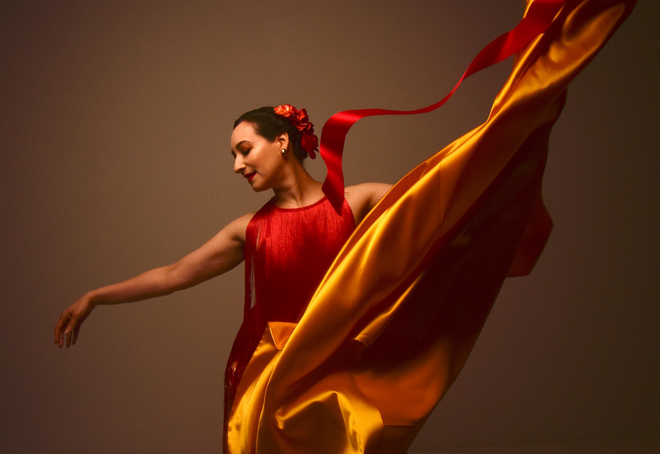
Why did you choose to close the album with “Catch the Light”?
The music was written when I was in seventh grade. I performed it as an instrumental at my junior high school class graduation, and at the time I called it “We’re Moving On.” When I was getting back to playing, during my recovery, it naturally came to my fingers and the lines “I’m gonna be fine one day / no memories in my way” popped into my head, over that piano melody that I’d written as a child. Any songwriter knows how satisfying that is, when lyrics just find their way naturally to an existing melody. I kept at it, and once the song was finished, it felt like a full circle—not only to end the album with, but to be able to say, with absolutely certainty, “my youth is over.” I don’t say that as a negative, but rather, a kind of letting go and welcoming of a new phase of my womanhood, and as a cancer thriver.
The album’s production and use of strings is very powerful.
I have always loved layering strings in the studio, but in this case I started with the essentials and built around them. I have a violinist (Kelly Halloran) and a cellist (Ward Williams) in my band The Sequins, and both happen to be incredible people and close friends. My cellist friend Dave Eggar was also very eager to be a part of the album. It was very natural for me to want to highlight strings and build our arrangements from there, as a result of these amazing friends coming to visit me while I was recovering. In the case of the string quartet, I was very encouraged by my coproducer Andy Zulla to go down that path, for “Both Hands” and “Bravery’s On Fire.” He also coproduced my album Choreographic, and has always agreed that strings help bridge my affection for pop with the more orchestral influences of my early years as a ballet dancer.
Has your approach to songwriting changed after your diagnosis with cancer?
I don’t think my approach to songwriting has changed one bit since my cancer diagnosis. If anything, the various methods and means I have cultivated to ‘harness the muse’ have been one of the only forms of stability I could muster, once I had the actual energy to resume doing so. Craft and discipline are things I look to know with appreciation for the time I put in all these years, to allow me to continue to use songwriting as a means of self-expression. One of my doctors said to me early on: “You may have cancer, but you are still the same person. Don’t forget that!” It was easy to forget, while I was really struggling with the worst of the chemo and so forth. I felt like someone else, something else. But as the clouds lifted, her words rang very true. I think my approach to eating, exercise and many other things has changed, yes. Songwriting? Not so much, thankfully.
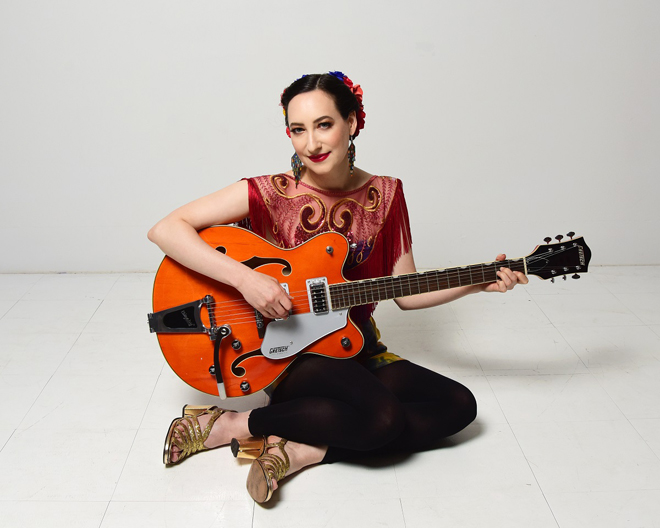
Were you eager to get back to live performance?
I find performing live to be pure joy and couldn’t wait to get back to it once I was well enough. Being on stage is the one area of my life that feels entirely void of struggle in any way whatsoever. Though, of course, I am always working on becoming a better player, singer and when appropriate, in terms of between-song banter, a ‘comedienne.’
Have you had to overcome any challenges of performing live?
The main challenge for me on tour really boils down to self care: sleeping enough, eating well and exercising, which affects everything else—including the knowledge that I am doing everything I can to remain in remission. The time on stage is the easy part—and hopefully that comes across as the joyful exercise in communication that I strive for.
You have an amazing team. Did you approach this album differently?
I never make demos anymore and haven’t for years. I just rehearse or tour behind new material, and build on that. For this album, my coproducer and I felt it was important to go through a good old-fashioned process of demo-ing each song, so we wouldn’t lose the vibe of each song, just me and my instrument. We were able to do all that at my home studio, and some of the more intimate arrangements, “Cave,” for example—were entirely built around my demos, and for such a personal record, that felt appropriate.
What instruments/equipment more accurately help you play this album live?
I use a few guitar pedals on both my electric and acoustic guitars, that I also used in the studio, including a ZVEX Box of Rock for distortion, and a Boss Tremolo pedal. I play vintage Martin and Gretsch guitars in the studio but they’re a bit delicate to tour with, so I travel with my trusty red Guild. It’s the only acoustic guitar I’ve ever toured with, and the Fishman pickup I put in it decades ago still sounds great. And of course, my Casio Privia is always with me, and while I play a Steinway in the studio, there’s really no better, lighter and altogether easier digital piano to tour with.
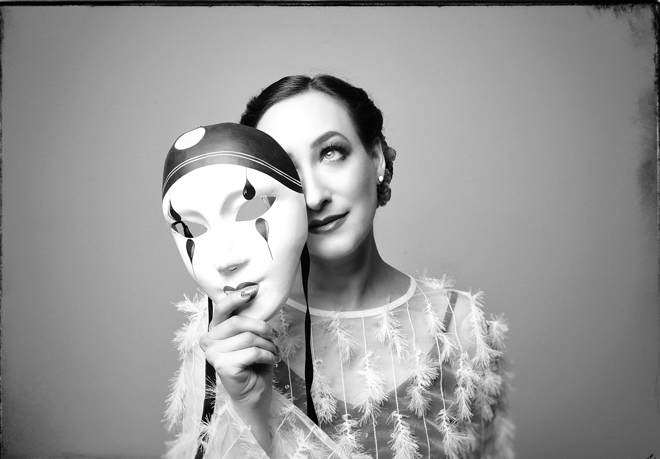
You’ve written strong, socially-conscious songs (The Tide album). Tell us about “Character.”
I wrote my title track “Character” to be a socially conscious song, but it’s in a different vein for me, stylistically. The lyrics may initially seem cryptic because the imagery is a bit abstract, but essentially they examine corruption in our current political landscape. As a songwriter, I hope I have managed to do so in a way that feels as poetic as it is timely, and as musical as it is urgent.
I still believe very much in the idea of an album as a collection and a concept, but yes—in terms of marketing and releasing, it is my job (also because I run a record label, MPress Records), to evolve with the times and be aware of how people are actually consuming/discovering music. Generally, we have been releasing 1-4 singles over a few months, in advance of the album. With some of the other artists on my label (Grace Pettis and Seth Glier), we are experimenting with stand-alone singles; it really just depends on the songs themselves, and what the rest of the plan may be, in terms of touring and so forth. We try not to be rigid, but for me personally, there is something about creating a full album that feels more satisfying and challenging. Plus, having come from a theatrical background as both a dancer and actor, it feels more like “An Evening With…”. Just like a live show, I want to take the listener somewhere, and hopefully leave them feeling just a little bit altered. That’s a different agenda than, say, wanting one particular track to stick in someone’s head.
What’s next?
I’m continuing to be on the road with Howard Jones, until the end of March. Then I’ll do some headline touring with various band members in the U.S., as well as the U.K. But I guess that’s now up in the air with travel restrictions. I’m aiming to be in the UK for all of May. Then back in the U.S. in June for the summer. I’ll be working on our new artist signing. She’s the brilliant and talented Grace Pettis. She’s phenomenal and full of positive energy. We here at MPress Records are thrilled to work with her.
Where can new fans get more info and stay updated?
instagram: Rachael_Sage
twitter: @rachaelsage
facebook: facebook.com/rachaelsagepage
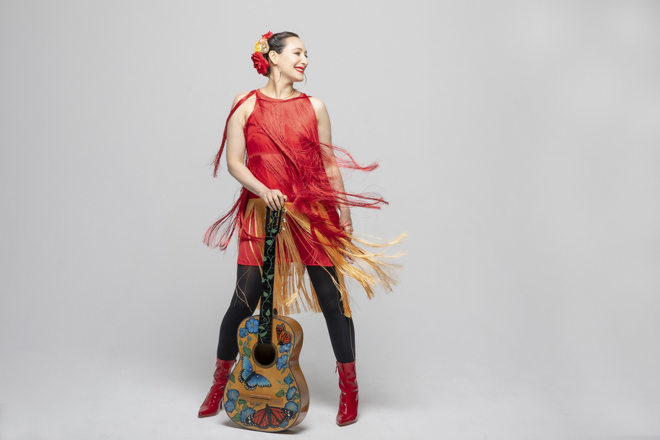



comment closed